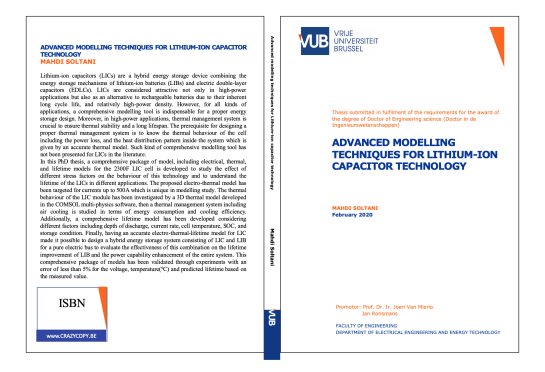
Lithium-ion capacitors (LICs) are a hybrid energy storage device combining the energy storage mechanisms of lithium-ion batteries (LIBs) and electric double-layer capacitors (EDLCs). LICs are considered attractive not only in high-power applications but also as an alternative to rechargeable batteries due to their inherent long cycle life, and relatively high-power density. However, for all kinds of applications, a comprehensive modelling tool is indispensable for a proper energy storage design. Moreover, in high-power applications, thermal management system is crucial to ensure thermal stability and a long lifespan. The prerequisite for designing a proper thermal management system is to know the thermal behaviour of the cell including the power loss, and the heat distribution pattern inside the system which is given by an accurate thermal model. Such kind of comprehensive modelling tool has not been presented for LICs in the literature.
In this PhD thesis, a comprehensive package of model, including electrical, thermal, and lifetime models for the 2300F LIC cell is developed to study the effect of different stress factors on the behaviour of this technology and to understand the lifetime of the LICs in different applications. The proposed electro-thermal model has been targeted for currents up to 500A which is unique in modelling study. The thermal behaviour of the LIC module has been investigated by a 3D thermal model developed in the COSMOL multi-physics software, then a thermal management system including air cooling is studied in terms of energy consumption and cooling efficiency. Additionally, a comprehensive lifetime model has been developed considering different factors including depth of discharge, current rate, cell temperature, SOC, and storage condition. Finally, having an accurate electro-thermal-lifetime model for LIC made it possible to design a hybrid energy storage system consisting of LIC and LIB for a pure electric bus to evaluate the effectiveness of this combination on the lifetime improvement of LIB and the power capability enhancement of the entire system. This comprehensive package of models has been validated through experiments with an error of less than 5% for the voltage, temperature (°C) and predicted lifetime based on the measured value.
